We have come far in the work on preventing deaths from some of the leading risk factors, tobacco and alcohol. We have a global framework convention for tobacco control and we have managed to expose big alcohol and their aggressive efforts of trying to affect the public with their biased research and deceitful marketing – but of course, we still have a long way to go.
We are facing a massive death toll caused by alcohol and tobacco and the corporate drivers behind the products.
- 6 million deaths due to tobacco every year;
- 3 million deaths due to alcohol every year;
- These two and other risk factors make NCDs the biggest killer on the planet and a gigantic obstacle to development.
Big Tobacco’s frank statement
But let me take you back for a moment, to the days when cigarette smoking wasn’t dangerous, when doctors actually promoted smoking as something that was good for you.
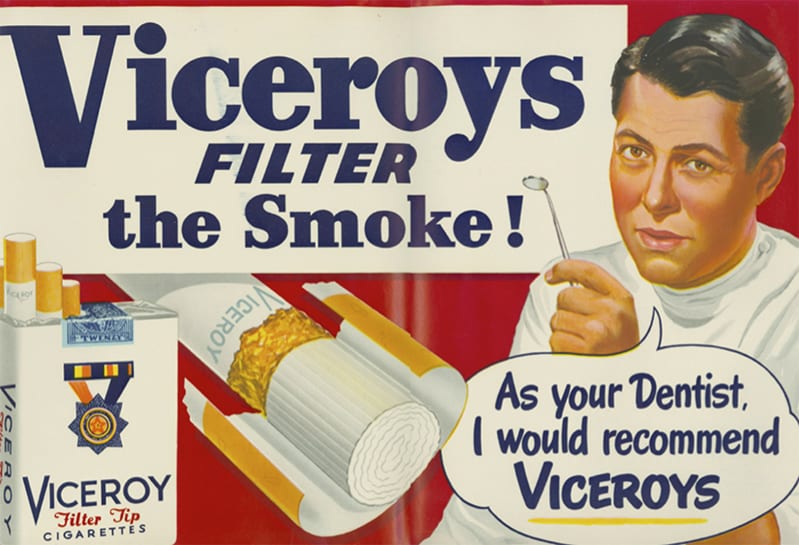
It took over 7000 scientific papers before smoking could be concluded as cause for lung cancer, laryngeal cancer and chronic bronchitis, published in the Surgeons General report in 1964.
Before the report came out, tobacco companies launched a historic campaign: “A frank statement to cigarette smokers”. It was published in 448 newspapers across North America and the estimated reach was over 43 million Americans, almost a third of the entire population.
We always have and always will cooperate closely with those whose task it is to safeguard the public’s health. “
And this was the 1950’s, and the potential cancer causing effects of tobacco were known since the beginning of the century! Since the tobacco companies felt that the winds of cigarette smoking were turning, they needed to convince the public that they had the American peoples’ health in mind. “A frank statement to cigarette smokers” thus become the start of that campaign. A campaign that went on for a half-century and costed millions of lives.
Big Food emerges using the Big Tobacco playbook
In 2009, Kelly Brownell and Kenneth Warner published an article called “The perils of ignoring history, big tobacco played dirty and millions died. How similar is big food?”. Here they investigate the striking similarities between these two industries and come to the conclusion that even though Big Food is a more complex entity than Big Tobacco, the unhealthy food industry is using the same tactics that the tobacco industry invented in the first place! I’ll give you some examples:
- Promotion of healthier or safer products
The tobacco industry introduced low tar, low nicotine and filter cigarettes in trying to promote safer alternatives.
The unhealthy food industry invented fortification as their method of choice. With fortification of unhealthy foods the industry added fiber, vitamins and minerals to foods such as Twinkies or sugar coated breakfast cereals. Or they started removing unhealthy nutrients like in low fat products. All to give the illusion to the customer that they don’t need to change their diet to eat healthier; instead they only need to choose food marketed as “healthier” or “safer” alternatives.
- CSR and public relations
Investing in communities, corporate social responsibility (CSR) and creating good public relations.
When the tobacco industry sponsored sports and entertainment, the fast food industry has CSR-projects like the Ronald McDonald Foundation promoting their social work towards sick children and families. KFC has had a campaign against breast cancer, where they launched pink buckets and claim that each bucket makes a difference, since they donated 50 cent for every bucket of chicken sold to breast cancer prevention. But they did this without mentioning the effects of fast food intake on breast cancer risk.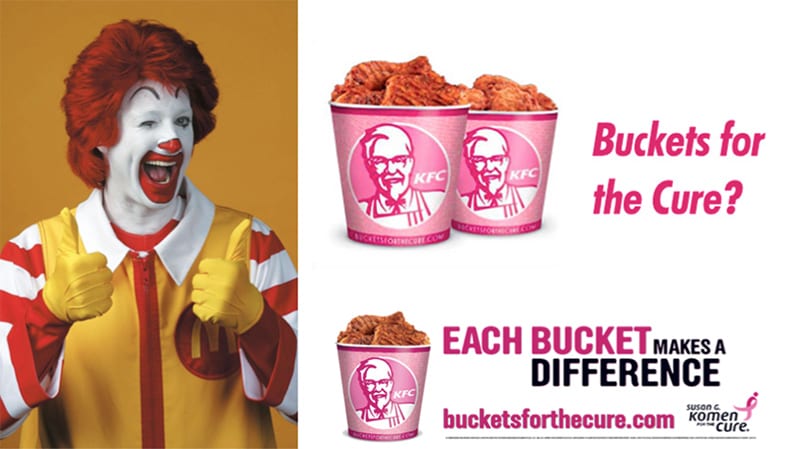
- Pervasive marketing
In the US, the food industry spends more money on direct advertising and promotion than any other industry. And in developing countries food advertising is rising. - Aggressive lobbying to influence governments
Throughout history, the tobacco industry has had and still has several lobbying and biased research groups to sway the public and decision makers’ minds in their favor.The unhealthy food industry has their own organizations to exert massive political influence. Take the for example the American Beverage Association, the Egg Nutrition Center, National Cattlemen’s Beef Association, The National Dairy Council, The Sugar Association, The Salt Institute, National Confectioners Association, all promoting the increased consumption of foods high in fat, sugar and salt, using third party techniques and trying to affect decision makers and ordinary people.
The former commissioner of the American food and drug administration (FDA) David Kessler has written extensively about the lobbying activities of Big Food, and draws several examples, like how the beef industry challenged the FDA to change fat labeling on food products, or when the 2004 WHO guidelines on “limiting the intake of free sugars” made the American Beverage Association unleash an attack on the WHO.
The American Beverage Association had three distinct arguments to WHO: (1) diet is personal responsibility, (2) there should be a stronger emphasis on physical activity and that (3) there are no good or bad foods, as long as people consume it in moderation.
Addressing this topic, Margret Chan, the director-general of WHO, said the following in her opening address of the global conference on health promotion in Helsinki in 2013:Efforts to prevent non-communicable diseases go against the business interests of powerful economic operators. In my view, this is one of the biggest challenges facing health promotion (…) it is not just Big Tobacco anymore. Public health must also contend with Big Food, Big Soda, and Big Alcohol. All of these industries fear regulation, and protect themselves by using the same tactics.“
- Shifting the focus
Just as the internal documents of the tobacco industry have stated that “doubt is our product”, trying to create health controversies so that customers may cling on to using their products. And when they couldn’t do that anymore, they started propagating other lifestyle changes as more important than cessation of tobacco smoking, like eating habits and physical activity; creating the idea that – whatever you do, don’t mind about smoking!
Coca Cola Company has a similar take, concerning the obesity epidemic. Here is a quote from their webpage:
As the world becomes more concerned about the public health consequences of obesity, some researchers and health advocates have unfairly blamed the consumption of sugar-sweetened beverages as the cause. Such (…) measures intended to discourage the consumption of our beverages is not only ineffective but could undermine finding a true solution. We are committed to being part of workable solutions to address obesity for the health of our consumers, our employees, our communities and ultimately our business.”
Later on they emphasize the importance of physical activity in the fight of the obesity epidemic, even though most experts agree that diet is the most important etiologic factor.
Big Buddies, Big Money
Sometimes it is even the same people behind involved. Philip Morris used to own both the alcohol producer Miller brewing and Kraft foods. Today, ALTRIA (formerly known as Philip Morris) is the biggest shareholder in SABMiller, the second largest beer producer in the world (until it was bought up by and merged with AB InBev most recently).

Essentially they are pursuing the same interests. Even the same consulting firm Exponent, an “expert in scientific consulting” has worked for Big Tobacco, Big Candy and Big Meat, with their latest report concluding red and processed meat had no causal link to cancer, once again using the same tactic of creating doubt about the harmful effects of their products in the eyes of the medical profession and public health advocates.
Corporate determinants of health
And let me remind you of what’s at stake. Over 50 million people die each year!
The vast majority of these deaths are caused by four diseases: cancer, diabetes, chronic lung and cardiovascular diseases. These are the non-communicable diseases (NCDs), and even though they’re not contagious they spread like an epidemic. The most important vectors causing this is food, tobacco and alcohol use and physical inactivity.
Why are NCDs a problem?
From an economic point of view, this is huge. If we don’t manage to halt the progression of NCDs, according to world economic forum, it will cost us 47 trillion dollars, in health care and non-output in worklife. And even though NCDs is the major cause of death in high income countries, the biggest burden of death and disease is put on low- and middle-income countries, which will exacerbate global inequalities even further. Needless to say, the humanitarian costs of NCDs are immeasurable.
Why are we seeing this?
Nicholas Freudenberg calls it the corporate consumption complex. He is a professor of public health at the CUNY, the City University of New York School of Public Health and Hunter College.
He describes the corporate Consumption Complex as web of different organizations, which includes producers, retailers, trade associations and lobbying groups. The corporate consumption complex is also consisting of law firms, PR-agencies, industry-funded think tanks and researchers, which are important channels for communication and political lobbying. The corporate consumption complex is also heavily relying on big banks, hedge funds and other investors that dictate their priorities as they provide the capital necessary for the corporation’s sustenance and expansion.
Corporate Consumption Complex and NCDs
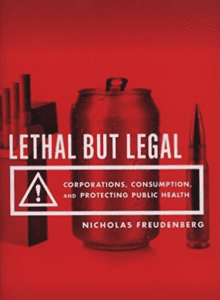 One thing the major multinational corporations and their social aspects and public relations organizations (SAPROs) have in common is that they are extremely well funded. They are also highly effective, extremely professional and experts on swinging policies and legislation in their favor. They have incredible influence in the EU, the US and globally.
One thing the major multinational corporations and their social aspects and public relations organizations (SAPROs) have in common is that they are extremely well funded. They are also highly effective, extremely professional and experts on swinging policies and legislation in their favor. They have incredible influence in the EU, the US and globally.
For example, the trade organization Pharmaceutical Research and Manufacturers of America has employed more so called “revolvers” than any other organization, meaning that there is a big turnover of people switching from government jobs directly to corporate employments at Big Pharma.
I could go on, drawing example after example how big business has influenced politics and people lives, but the ones I just mentioned, together with the alcohol and tobacco industry have greatest influence on health and put our wellbeing, global development and economic prosperity at a great risk – for the sake of profits for a few shareholders and corporate executives.
NCDs, driven by corporate greed: a system failure
When we hear this, maybe we are tempted to view these industries as evil?
Is this a moral crisis of our modern society?
Even though I don’t see the CEOs of these companies as angels, it is just as much a crisis of the system. There is no hidden agenda, at least most of the time. Most of what is changing in our world is happening in front of our eyes and something we can read about in our newspapers. It is a system were profit is prioritized over people. It’s a system that pits corporate profits against public welfare and sustainable development. It’s a system where our politicians choose to protect corporate interests, not the peoples’ interests. It’s a system where the concept of consumption has changed drastically.
Once upon a time, free enterprise capitalism prospered by meeting the real needs of real people. It was kind of a cycle of producers and consumers. Today, however, hyper-capitalism can only profit and prosper from those whose needs already have been satisfied. Industries in the corporate consumption complex must therefore create and invent new needs, needs which never can be satisfied.
In 1955, French economist Victor Lebow stated:
Our enormously productive economy demands that we make consumption our way of life, that we convert the buying and use of goods into rituals, that we seek our spiritual satisfactions, our ego satisfactions, in consumption.”
An example of this is that the US and Canada, with just over 5% of the world’s population, are responsible for a third of the world’s private consumption expenditure. Taken together with Western Europe it means that 11,5% of the world’s population control 60% of the world’s consumer spending.
Lebow foresaw that consumption, or hyper-consumption, is necessary for the economy to keep pace with capitalism. Big business understood this as well and when globalization was starting to really gear up and connecting countries and economies all over the world, unrestricted, free market forces became its holy grail. With the wave of neoliberal economics and governments paving the road for big business, what we see today should not come as a surprise to anyone. With fewer and fewer restrictions came increasing market concentration and thus bigger and bigger profits for the largest multinational companies; this way their influence grew and keeps growing.
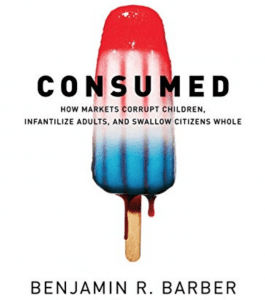 The largest and second largest beer producers have just merged – the third largest corporate merger in human history. The new company not only wields huge power over the beer market, controlling every third beer sold globally. It also has extreme political influence across the world. And the gigantic investment means that AB InBev now has to pursue profits aggressively so that the merger will pay off for shareholders, investors and corporate executives. Public health and sustainable human development consideration obviously don’t figure at all.
The largest and second largest beer producers have just merged – the third largest corporate merger in human history. The new company not only wields huge power over the beer market, controlling every third beer sold globally. It also has extreme political influence across the world. And the gigantic investment means that AB InBev now has to pursue profits aggressively so that the merger will pay off for shareholders, investors and corporate executives. Public health and sustainable human development consideration obviously don’t figure at all.
In this context, today’s hyper-consumption industries have managed to create a new ethos for the modern world. Benjamin Barber calls it the infantilist ethos. He means that the corporations I have mentioned are all seeking to turn citizens into the perfect consumers – people that desire instant gratification; people that need quick, easy and simple life solutions; people that rely on consumption not citizenship for feeling happy.
Consumers, not citizens
Being mindful of the NCDs epidemic – often also called lifestyle diseases or diseases driven by corporate consumption – it becomes especially problematic when citizens are turned into consumers.
Let use this American study as an example: In 1966, 83% of American students saw their university studies as a means of achieving a meaningful life philosophy while only 43% saw it as a way of making money. Thirty years later, the numbers were reversed! 42% saw their higher education as a way of acquiring a meaningful life philosophy while 77% only saw it as a way of making money.
Interestingly, the ones that had been watching the most TV, were also more susceptible to the money-making attitude. Other sociologists also confirm this emergence of moral values characterized by individualism and relativism, where emerging adults cannot fully and logically defend their own moral philosophy.
Towards a solution
In the face of the corporate impact on health, development and citizenship, the questions must be: Then what is the solution?
This would be the spot for some inspiring words and ideas. But I am afraid that this kind of problem doesn’t have one quick, simple and easy solution.
I think a lot of things need to change: We need to expose the unethical business practices of these corporations. We need to curb their most harmful practices and regulate them much more strictly. We need to shift to a focus on Human Rights, not corporate rights, in order to promote health and well-being. We need to change the incentives of business and with that the infrastructure of capitalism. First and foremost, we need to have a discussion about which kind of society we want to live in.
Do we want big business to set the agenda of public health, and therefore our lives? And do we want our children to be raised by corporations that imbibe them with values of individualism, instant gratification and relativism? Or do we want our children to be raised by our communities and teach them values of altruism, civic participation and a sense of compassion with others?
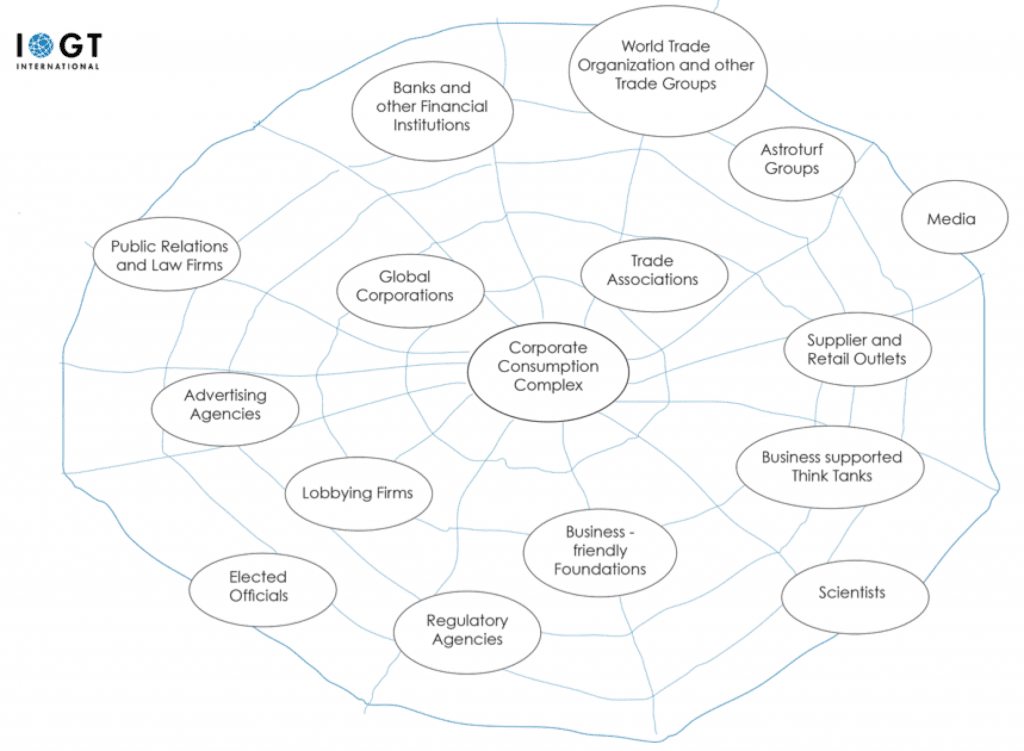

I find interesting to look at the whole quote from Victor Lebow, it gives a more diverse picture of what he actually was predicting.
“Our enormously productive economy demands that we make consumption our way of life, that we convert the buying and use of goods into rituals, that we seek our spiritual satisfactions, our ego satisfactions, in consumption. The measure of social status, of social acceptance, of prestige, is now to be found in our consumptive patterns. The very meaning and significance of our lives today expressed in consumptive terms. The greater the pressures upon the individual to conform to safe and accepted social standards, the more does he tend to express his aspirations and his individuality in terms of what he wears, drives, eats- his home, his car, his pattern of food serving, his hobbies.
These commodities and services must be offered to the consumer with a special urgency. We require not only “forced draft” consumption, but “expensive” consumption as well. We need things consumed, burned up, worn out, replaced, and discarded at an ever increasing pace. We need to have people eat, drink, dress, ride, live, with ever more complicated and, therefore, constantly more expensive consumption.”